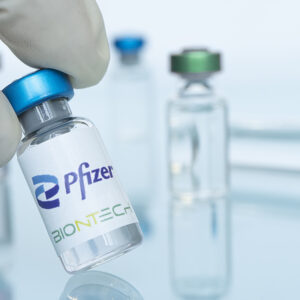It is an unfortunate reality in our global society that, whenever great human need exists, there will be people of ill intent attempting to fulfill that need with fraudulent solutions that have the potential to do serious harm. We’re seeing that right now in conjunction with the worldwide effort to vaccinate people against the COVID-19 virus. Criminals are taking advantage of our collective desperation to be vaccinated and bring an end to this pandemic by producing and distributing counterfeit vaccines as fast as they can.
In Mexico, people have been paying the equivalent of $1,000 a dose for fake vaccines kept in portable coolers. Authorities in Poland have seized “vaccine” vials that are filled instead with components of anti-wrinkle treatments. In locales as far-flung as China and South Africa, law enforcement officials are impounding thousands of fake vaccine doses.
The World Health Organization has issued an alert saying these fraudulent substances “pose a serious risk to global public health.” A separate analysis by Oxford University found that 150 reports of incidents on quality issues related to COVID-19 vaccines were linked to 41 countries and the internet generally.
These are, in fact, vile crimes, deluding innocent and frightened people into believing they are being protected against a life-threatening virus when they are not. That can only increase new infections and deaths worldwide.
Unfortunately, this disturbing trend could soon get much worse. If the Biden administration gets its way, the World Trade Organization could greenlight a proposal to waive the patent and other intellectual property protections on COVID-19 vaccines. Doing so would vastly expand the opportunity for counterfeits and substandard products to enter global supply chains.
Under the current rules, only the creators of COVID-19 vaccines – Pfizer, BioNTech, Moderna, Johnson & Johnson, etc. – along with their partners and licensees, have the legal right to manufacture and distribute the vaccines they developed. For both of our sectors, public health and law enforcement, this is a highly advantageous situation. We have a limited universe of reputable companies manufacturing heavily-vetted products, ensuring public safety while making it easier to identify and track down illegal operators with fake products.
Led by India and South Africa in a proposal first put forward last year, however, more than 100 WTO nations now support temporarily suspending the Agreement on Trade-Related Aspects of Intellectual Property, commonly known in trade circles as TRIPS.
Their argument is that in the midst of a pandemic and universal need, no entity should have the right to traditional intellectual property protections. Setting aside intellectual property rights, they say, is the best way to expand production to meet global demand, particularly in underdeveloped countries.
Yet the effort to get vaccines to everyone who needs them has been steadily gaining momentum in the months since India and South Africa put the proposal on the table. Legitimate vaccine producers have already pledged to supply 12.5 billion doses by the end of this year and are cooperating with the World Health Organization to produce vaccines for more than 90 developing nations at a discounted price—in some cases, no more than the cost of production.
Waiving intellectual property rights will make counterfeiting much easier and raise significant safety issues, even among manufacturers who are not acting maliciously. The latter may have the desire to make high-quality and affordable vaccines but lack the ability to do so. The mRNA vaccines of Pfizer and Moderna, in particular, entail advanced manufacturing processes and require high-tech facilities.
A TRIPS agreement waiver could open the floodgates for all sorts of manufacturers and marketers, large and small, to pump substandard vaccine products into the marketplaces of multiple countries. With narrowing profit margins, the temptation to cut corners on safety will be ever-present. This can easily lead to a frenetic vaccine bazaar of sorts in which counterfeits and defective products could all too rapidly gain a foothold, particularly in countries with little regulation and poorly organized supply chains. For law enforcement to try to police vaccine sanctity and safety in this kind of environment would be incredibly challenging, and would potentially prolong the pandemic indefinitely.
Authorities in both health and law enforcement have a problem on their hands right now. The global boom in vaccine counterfeiting is telling us, in no uncertain terms, that erasing intellectual property rights is the last thing we should be doing.


